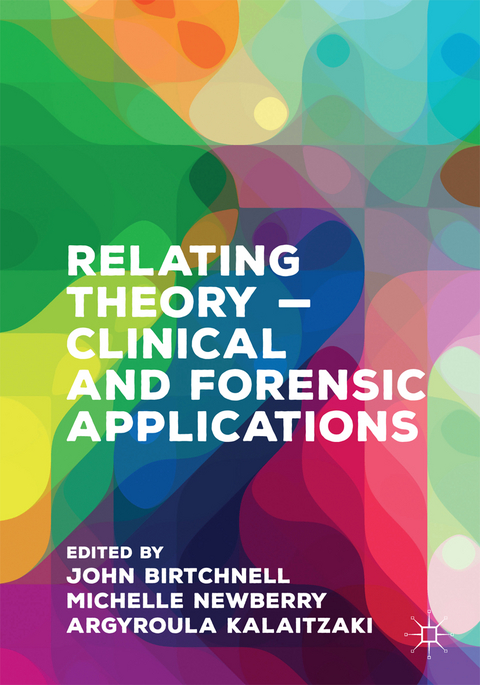
Relating Theory – Clinical and Forensic Applications
Palgrave Macmillan (Verlag)
978-1-349-70029-5 (ISBN)
John Birtchnell trained in medicine and worked as a Consultant Psychiatrist at the Maudsley Hospital, London, UK. For over twenty years he was a Scientific Officer of the Medical Research Council and has published extensively in the psychiatric literature including three previous books on Relating Theory. Michelle Newberry is a Chartered Psychologist and Senior Lecturer at Sheffield Hallam University, UK where she is the Course Director for the MSc Forensic Psychology. She has worked with personality disordered offenders in psychiatric hospitals and in a therapeutic community prison. She has a number of publications on the relating tendencies of offenders. Argyroula Kalaitzaki is Assistant Professor of Clinical Psychology at the Technological Educational Institute of Crete, Greece. She has a number of publications on Relating Theory. Her research interests also include (inter)relating within couples and families, the effectiveness of psychotherapy, dating violence and abuse, parenting, social networks, and recently, positive psychology.
Part I: Introduction to Relating Theory.- Chapter 1. What is Relating Theory?;John Birtchnell.- Chapter 2. Comparing Birtchnell's Octagon with Leary's Circle;John Birtchnell.- Part II: Measures Based on Relating Theory.- Chapter 3. The Person's Relating to Others Questionnaire (PROQ); Argyroula Kalaitzaki & John Birtchnel.- Chapter 4. The Psychometric Viability of the Person's Relating to Others Questionnaire (PROQ);Sean Hammond.- Chapter 5. The Couple's Relating to Each Other Questionnaire (CREOQ): A Measure of Negative Interrelating; Argyroula Kalaitzaki & John Birtchnell.- Chapter 6. The Us as a Couple Questionnaire (US): A Unidimensional Measure of Couple Satisfaction;Cor de Jong, Laura DeFuentes-Merillas, Florieke van de Werken & John Birtchnell.- Chapter 7. The Family Members Interrelating Questionnaire (FMIQ): A Measure of Interrelating between Young Adults and their Parents;Argyroula Kalaitzaki.- Chapter 8. Parental Relating: A New Conceptualisation of Parenting Styles and the Development of the Adult Recollection of Parental Relating Questionnaire (ARPRQ); Cristina Harnagea.- Chapter 9. The Person’s Relating Interview (PRI) and the Observation of Relating Behaviour (ORB): Observers' Perceptions of Other People's Interpersonal Relating; Argyroula Kalaitzaki, Michelle Newberry & John Birtchnell.- Chapter 10. The Person's Relating to Others at Work Questionnaire (PROWQ): A Modified Version of the PROQ Applied to Job Sharing at Senior Levels in the Workplace; Lucy Daniels.- Chapter 11. The Person's Positive Relating to Others Questionnaire (PPROQ): A New Relating Instrument Grounded in Positive Psychology; Argyroula Kalaitzaki & Sean Hammond.- Part III: Applications of Relating Theory to Clinical Psychology.- Chapter 12. Relating Therapy; John Birtchnell.- Chapter 13. Negative Relating and Psychotherap; Argyroula Kalaitzaki & John Birtchnell.- Chapter 14. The Use of the Couple's Relating to Each Other Questionnaire (CREOQ) in Couple Therapy;Deidre Gordon.- Chapter 15. Interrelating Within the Families of Schizophrenics Before Their First Psychotic Episode; Joannis Nestoros, Theodora Seliniotaki, Anastasia Vergoti & Emmanouil Benioudakis.- Chatper 16. Relatedness Reflected Through the Group Analytic Mirror; Marion Brown.- Chapter 17. Changes in Interrelating Over the Course of Psychotherapy; Argyroula Kalaitzaki.- Part IV: Applications of Relating theory to Forensic Psychology.- Chapter 18. Are Specific Criminal Offences Associated with Particular Negative Interpersonal Relating Styles?; Michelle Newberry & John Birtchnell.- Chapter 19. Interpersonal Relating, Risk Taking Behaviour and Alcohol Use in Young Adults; Lydia de Haan, Hein de Haan, Eibert Heerdink & Cor de Jong.- Chapter 20. Negative Relating and Psychopathy; Michelle Newberry.- Chapter 21. The Sadistic Impulse and Relating to Others; Aisling O'Meara & Sean Hammond.- Chapter 22. Using the Person's Relating to Others Questionnaire (PROQ) to Support Offenders with Intellectual Disability and Personality Disorder; Jon Taylor.- Chapter 23. Changes in Offenders Interpersonal Relating Style Following Treatment in Forensic Settings; Michelle Newberry.- Chapter 24. Further Directions for Research in Relating Theory and Practice; Argyroula Kalaitzaki, Michelle Newberry & John Birtchnell
| Erscheinungsdatum | 19.12.2018 |
|---|---|
| Zusatzinfo | 10 Illustrations, color; 5 Illustrations, black and white; XXIV, 356 p. 15 illus., 10 illus. in color. |
| Verlagsort | Basingstoke |
| Sprache | englisch |
| Maße | 148 x 210 mm |
| Themenwelt | Geisteswissenschaften ► Psychologie ► Klinische Psychologie |
| Medizin / Pharmazie ► Medizinische Fachgebiete ► Psychiatrie / Psychotherapie | |
| Schlagworte | Community • interpersonal • Interpersonal octagon • psychotherapy • relationships • therapy |
| ISBN-10 | 1-349-70029-0 / 1349700290 |
| ISBN-13 | 978-1-349-70029-5 / 9781349700295 |
| Zustand | Neuware |
| Haben Sie eine Frage zum Produkt? |
aus dem Bereich


